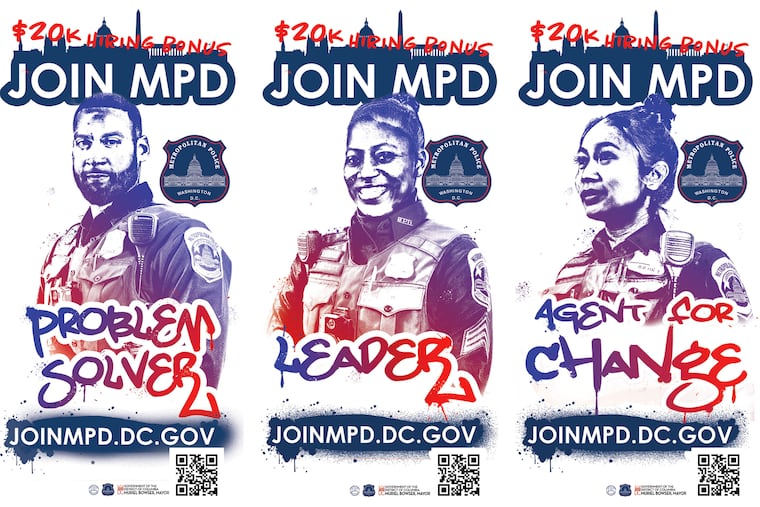D.C.’s police department is recruiting in Philly, offering a $20k hiring bonus. The Philadelphia Police Department isn’t worried.
It’s not all about money, according to PPD’s recruitment head.

Some police recruitment ads posted on bike rental stations in Philadelphia tout up to $20,000 in hiring bonuses. But there’s one major catch: The jobs are for the Metropolitan Police Department in Washington, D.C.
D.C.’s police force has struggled to find recruits in the competitive labor market and it’s trying to stand out with generous hiring bonuses and recruitment campaigns in metros like New York City and Philadelphia. But these efforts come as the Philadelphia Police Department faces recruitment woes of its own.
Both departments are trying to fill hundreds of vacancies amid rising gun violence in their cities and as the profession has come under scrutiny since the 2020 police killing of George Floyd in Minneapolis, which sparked a racial justice movement and national reckoning over policing.
Philadelphia police are short about 500 officers, and pension records show the department expects hundreds more employees will retire within the next four years. And more than 500 officers are off duty on injury claims, a trend driven in part by abuse of a state disability benefit.
Lt. Patrick Loftus, director of MPD’s Strategic Engagement Office, would not offer a desired number of recruits, noting the department was focused on hiring the best and “focused on quality instead of quantity.” But an April report by NPR indicated the department is trying to boost its ranks from about 3,500 to 4,000 officers.
In its effort to stand out, MPD announced a $20,000 hiring bonus in June — $10,000 upon initial hiring with another $10,000 paid out when recruits graduate from the police academy, meaning hires could earn more than $80,000 in their first year. Those who receive the bonus are eligible for other benefits, including $6,000 in temporary rental assistance.
The ads are an extension of the department’s efforts to “search for the best talent from around the country,” according to Loftus.
“Philly’s close proximity to Washington, DC makes it easy for applicants to complete the hiring process,” he wrote in an email. “Since we are so close to Philly, when someone from Philly joins MPD, it is just a short drive, bus, or train ride back to visit family and friends.”
Three versions of the ads were rolled out in Philly in mid-October. Loftus said it’s too soon to say how effective the campaign has been, but similar ads cast in New York City have brought about “promising results.”
Amid changing attitudes toward policing and an unrelenting gun violence crisis, the Philadelphia Police Department is not worried D.C. might be drawing local talent with hefty bonuses. Philly hires start off at just shy of $60,000 and can reach close to $64,000 within six months. After an 18-month probationary period, MPD’s new hires make close to $66, 000 but they also have to afford the D.C. area’s higher cost of living.
Officers in Washington are not required to live in the city, while Philadelphia police officers must move into the city within a year of getting hired. Earlier this year, Philadelphia waived a requirement that new recruits live in the city for at least a year before starting the job.
Capt. Tyrell McCoy, who leads recruitment for PPD, said Philly remains an appealing destination for recruits due to its being a large city with the attractions that come with it, while remaining more affordable than D.C.
“Money is only a portion of it,” added McCoy. “People have to be willing to relocate, they have to be willing to uproot their lives for a new environment, and then obviously, start a new career.”
Maria “Maki” Haberfeld, a professor of police science and department chair at John Jay College in New York City, said she wouldn’t be so confident. A significant bonus in a comparable job could be enticing to applicants. It’s why Haberfeld contends that yearslong recruitment struggles should make larger police departments reconsider how they use the police officers they do have.
“At any given moment a police officer faces hundreds of members of the community,” she said. “So we know that it’s not about the ability of this one officer to contain and achieve compliance from 200 to 300 members of the community. It’s about whether or not the officer is respected enough to achieve the compliance.”
PPD has started to take on some of that work. A recent arbitration agreement between the city and the police union allows the department to replace police officers working in mail or graphic design with civilians. (The agreement also allows for a $2,000 hiring bonus.)
Not wanting to be left behind, PPD is slated to reconsider using television, radio, and billboards to recruit in neighboring New Jersey, Delaware, and Philly suburbs now that the residency requirement has been lifted.
McCoy said that though the outreach will go beyond city limits, the department will continue to focus on finding diverse local hires ahead of the new year.
Staff writer Anna Orso contributed to this article.